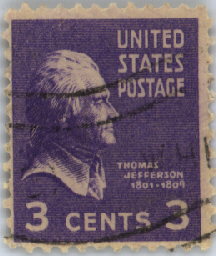FRtR > Outlines > American History (1990) > Chapter Three > Second war with England (10/11)
An Outline of American History (1990)
Chapter Three
Second war with England (10/11)
< Previous Page * Next Page >
Jefferson's widespread popularity assured his
reelection in
1804. Louisiana was manifestly a great prize, the country was
prosperous, and the President had tried hard to please all sections.
In his second term, which began in 1805, Jefferson declared
American neutrality during the struggle between Great Britain
and France, whose forces had set up blockades that struck heavy
blows at American commerce. No American craft could trade
with France or Britain without threat of seizure.
The British had built their navy to more than 700 warships,
manned by nearly 150,000 sailors and marines, which kept Britain
safe, protected her commerce, and preserved her communications
with her colonies. Yet the men of her fleet were so poorly treated
that it was impossible to obtain crews by free enlistment. Many
sailors deserted and found refuge on American vessels. In these
circumstances, British officers regarded it their right to search
American ships and take off British subjects, to the great
humiliation of the Americans. Moreover, British officers frequently
impressed American seamen into their service.
 Jefferson finally persuaded Congress to pass an Embargo Act,
forbidding foreign commerce. The effects of the law were disastrous.
Shipping interests were almost ruined by the measure, and
discontent rose in New England and New York. Agricultural
interests found that they too were suffering heavily, for prices
dropped drastically when the southern and western farmers could
not ship their surplus grain, meat, and tobacco.
Jefferson finally persuaded Congress to pass an Embargo Act,
forbidding foreign commerce. The effects of the law were disastrous.
Shipping interests were almost ruined by the measure, and
discontent rose in New England and New York. Agricultural
interests found that they too were suffering heavily, for prices
dropped drastically when the southern and western farmers could
not ship their surplus grain, meat, and tobacco.
In a single year American exports fell to one-fifth of their
former volume. But the hope that the embargo would starve Great Britain
into a change of policy failed. As the grumbling at home
increased, Jefferson turned to a milder measure, which conciliated
the domestic shipping interests. Substituted for the embargo was
a non-intercourse law that permitted commerce with all countries
except Britain or France and their dependencies. This paved the
way for negotiations by authorizing the President to suspend the
operation of the law against either of these upon the withdrawal
of its restrictions upon American trade. In 1810, Napoleon
announced that he had abandoned his measures. In fact he continued
to maintain them, but the United States took him at his word and
thereafter limited its non-intercourse to Great Britain.
In 1809, James Madison succeeded Jefferson.
Relations with
Great Britain grew worse, and the two countries drifted rapidly
toward war. The President laid before Congress a detailed report,
showing 6,057 instances in which the British had impressed
American citizens. In addition, northwestern settlers had suffered
from attacks by Indians, who they believed had been encouraged
by British agents in Canada. In 1812, the United States declared
war on Britain.
< Previous Page * Next Page >
 Jefferson finally persuaded Congress to pass an Embargo Act,
forbidding foreign commerce. The effects of the law were disastrous.
Shipping interests were almost ruined by the measure, and
discontent rose in New England and New York. Agricultural
interests found that they too were suffering heavily, for prices
dropped drastically when the southern and western farmers could
not ship their surplus grain, meat, and tobacco.
Jefferson finally persuaded Congress to pass an Embargo Act,
forbidding foreign commerce. The effects of the law were disastrous.
Shipping interests were almost ruined by the measure, and
discontent rose in New England and New York. Agricultural
interests found that they too were suffering heavily, for prices
dropped drastically when the southern and western farmers could
not ship their surplus grain, meat, and tobacco.